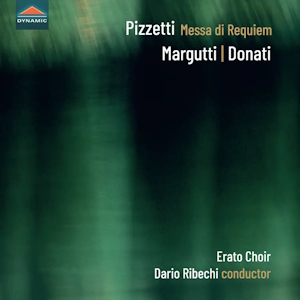
Ildebrando Pizzetti (1880-1968)
Messa da Requiem (1922)
Corrado Margutti (b. 1974)
Kyrie and Sanctus from Missa Lorca (2002-2006)
Lorenzo Donati (b. 1972)
Sicut cervus (2016)
Marco Saccardin (baritone)
Erato Choir/Dario Ribechi
rec. 2023, Abbazia di Fruttuaria, San Benigno Canavese, Turin, Italy
Texts and English translation included
Dynamic CDS8017 [52]
Here we have a disc of twentieth century Italian sacred music for a cappella choir. The main work is the Pizzetti Requiem, and the disc is completed with two more recent pieces.
Ildebrando Pizzetti was of the generation which also included Respighi, Malipiero and Casella. As well as composing many operas and some orchestral works, he was a teacher and writer and an authority on early Italian music. On the debit side, he became an active supporter of fascism, possibly resulting from his admiration for the writer Gabriele d’Annunzio, who went the same way.
The Requiem was commissioned in 1922 for the birth anniversary of King Umberto I, who had been murdered in 1900. Pizzetti sets the entire Latin text and draws on early polyphonic music and modal scales but also more modern techniques such as rhythmic irregularities and dissonant harmonies. The choir is divided in various ways, ranging from four parts to twelve. There is great variety in the setting, with the Dies Irae being, as usual, the longest single number while the Agnus Dei is only twenty-nine bars long. Be that as it may, the work is ravishingly beautiful, and its skilful use of old materials within a twentieth century idiom reminded me of Vaughan Williams’ near-contemporaneous Mass in G Minor. If you like that, you will like this.
Then we have two movements only from Corrado Marghutti’s Missa Lorca. This combines the words of the mass with related poems by Lorca, which are sung in Spanish interwoven with the Latin of the mass. In the Kyrie, Margutti quotes Monteverdi’s setting of the Christe eleison completely. In the Sanctus we hear a solo baritone, who maintains a dialogue with the choir, singing in Spanish while the choir sings the Latin.
Lorenzo Donati’s Sicut cervus sets the opening words of Psalm 43 in the Vulgate version (Psalm 42 in English Bibles). There is a famous setting of this by Palestrina, which Donatoni draws on, breaking it up and reusing it in a rich texture which is written in sixteen parts. There are also spoken words dropped into the setting from time to time, which made me think of the opening of Schoenberg’s Moses und Aron, where the voice of God is rendered by a combination of singing and speaking voices.
Erato Choir is a professional body and is absolutely secure in this often very tricky music. They have a lovely tone and blend and can also produce solo lines when required. Their founder and conductor Dario Ribechi studied under the celebrated choir trainer Tönu Kaljuste at Tallinn in Estonia and has won many awards. The recording is full and clear, perhaps slightly close but nothing to worry about.
There are several other recordings of the Pizzetti, which is not surprising as it is such a lovely work. I haven’t heard them, but this one is certainly excellent. The Margutti I found attractive but less memorable – incidentally, Margutti wrote the sleevenote here – and the Donatoni is more substantial. There was a complete recording of the Missa Lorca on the Astrum label but it has been deleted. However, the Pizzetti is the work to go for; for me, it was a real discovery.
Stephen Barber
Buying this recording via a link below generates revenue for MWI, which helps the site remain free




















